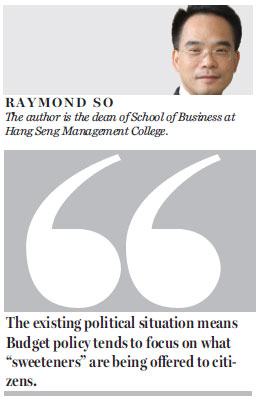Focus of the Budget needs to be changed
Updated: 2015-03-05 07:41
By Baymond So(HK Edition)
|
|||||||||
The much-anticipated Budget was announced in the last week of February. This Budget received more positive comments than usual. Critics of the Budget are still mainly focusing on the number of "sweeteners" being paid out to people. This is usually the highlight for ordinary people. In Hong Kong, this phenomenon has quite a unique historical precedent. The city's public finances also operate under certain constraints. They must obey fiscal disciplines required under the Basic Law which state that government spending should be within its means. The government cannot simply spend as it wishes. This is because once spending increases, it is difficult to reduce it again. The government tends to spend less in the short term. This approach is correct, given that Hong Kong is a special administrative region of China. In order to avoid problems and unnecessary disputes, Hong Kong needs a sound, independent fiscal system. This limits the SAR's tendency to borrow money to cover budget deficits.
The requirements of the Basic Law invariably make the government cautious with regards to new Budget policies. This results in a conservative outlook when evaluating revenue and a tough approach with regards to spending. But there is also a natural inclination to underestimate potential revenue and to overestimate expected expenditure. The result is a belief that Hong Kong will still be left with either a fiscal surplus, or a slight deficit. When the Budget statistics were released, many noted that the government had been unable to accurately predict its financial performance. However, in part this is a consequence of institutional constraints.
Another major constraint is the nature of Hong Kong's free-market economy. Estimating Hong Kong's economic conditions for a year hence is not always easy. When predicting future economic conditions, the city needs to make forecasts based on worldwide economic factors. This is a daunting task because there is always great uncertainty. In considering how much revenue there will be Hong Kong has to consider sharp increases in salaries tax, profits tax and stamp duties. These all relate to external economic conditions.
Therefore, by definition inaccurate revenue forecasts are inevitable, unless there are stable sources of revenue. Otherwise the government cannot avoid uncertainty. The fact that Hong Kong is operating in an increasingly globalized environment exacerbates matters. These factors dictate that Hong Kong's sources of public revenue cannot be stable.
Sometimes, Hong Kong's public revenue forecasts are inaccurate. Therefore, it is tough planning for long-term public spending. Public criticism of the government's management of public finances is common. Such criticisms result from the current political system. For which he government has to bear some responsibility.
The existing political situation means Budget policy tends to focus on what "sweeteners" are being offered to citizens. The political system means there is no possibility of a single ruling party in Hong Kong. There are, therefore, many opposition lawmakers.
This encourages the government to try to appease the opposition. Paying out sweeteners is the most logical way of doing this. The public then expects more of them. Politicians are happy to meet their demands. The end result is too many sweeteners.
This situation is financially irresponsible. In his latest Budget, the financial secretary discussed broadening the tax base. For two years he has warned about the potential for a future structural deficit. This shows that the government is well aware of the pitfalls of always paying out sweeteners. But if Hong Kong sees no significant changes in the current system, these problems will perpetuate year after year.

(HK Edition 03/05/2015 page10)